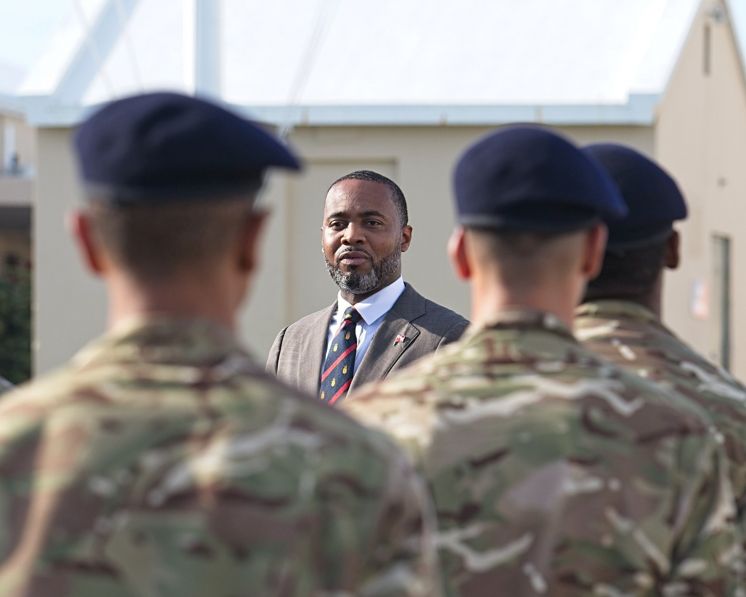VIP's Meet the RBR's Newest Troops
The Commander-inChief of the Royal Bermuda Regiment today (TUES) paid a visit to new recruits on their first field exercise.
Governor Rena Lalgie visited about 50 new soldiers as they got to grips with life on manoeuvres at Hog Bay Park in Sandys.
Ms Lalgie, who visited Warwick Camp last week, toured the area, watched the troops practise patrol techniques and fieldcraft and spoke to the recruits.
She said: “The Royal Bermuda Regiment plays an incredibly important role in keeping Bermuda safe and also in representing Bermuda abroad.”
Ms Lalgie praised the RBR for its hurricane response abilities and its service over the Covid-19 pandemic – its longest deployment outside wartime.
She said: “It’s quite clear to me that the people of Bermuda have a very strong trust in knowing that the Regiment is here as we head into another hurricane season.
“The last year has really reminded us this is not just a Regiment preparing for hurricanes. It’s helping in disasters and providing skills they continue to deploy in all sorts of circumstances we might find ourselves in.”
Ms Lalgie added: “I hope they go on to achieve not just in the Regiment, but in their civilian lives as well.”
She said: “It’s reassuring we have volunteers in such large numbers this year.”
Ms Lalgie’s visit followed last week’s tour of Warwick Camp by Premier David Burt and Minister of National Security Renee Ming as the rookie troops were in their first few days of training.
The two also saw some of the equipment and trucks used by soldiers to cope with everything from hurricanes to Covid-19.
Mr Burt told the soldiers: “I am thrilled that 48 persons have chosen to serve in a very important part of Bermuda’s fabric.
“I want all of you to be proud of what you’ve done, to learn, and to know that you will always have the support of the Bermuda Government through your journey and into the future.”
Mr Burt and Ms Ming saw the latest troop carriers used by the RBR – Isuzu trucks, which can carry more soldiers and equipment than the former fleet of ageing Toyota Land Cruisers, as well as trailers packed with humanitarian and disaster relief gear ready to roll at a moment’s notice.
Ms Ming said: “Serving among the ranks of the Royal Bermuda Regiment can be a fulfilling, rewarding and enriching experience.
“A major benefit for our soldiers is receiving specialised training for disaster relief work, having access to better educational opportunities and the potential for full-time careers.
“RBR soldiers also have the opportunity to travel overseas and undergo military, trade and leadership training.
“Opportunities also exist for soldiers to join the Regiment Band, logistics, Coast Guard, administration or construction departments.
“And for those who have exceptional educational qualifications, there are opportunities to swiftly advance through the ranks of the service.”
RBR Commanding Officer Lieutenant Colonel Ben Beasley said: “It was a pleasure to have the Premier and the Minister visit, particularly as they showed such support to Bermuda’s newest soldiers.
“Their consistent support and appreciation of our service reaffirms the Government’s commitment to a strong, capable and well-equipped Regiment.”
Col Beasley added that the camp was the largest since conscription was abolished in 2018.
He said: “The quality of recruits continues to improve as we raise the standards of entry.”
Col Beasley added the RBR offered the country a flexible service on land and sea and good value for money.
He said: “Covid-19 and the ability to stand up the Coast Guard so quickly shows not only our agility, but our adaptability. That comes through common core skills and training.”
Col Beasley added: “Those who have never experienced life in an RBR uniform might not be aware of the training and development that takes place on training weekends and overseas camps.
“They learn military skills, but they also develop other skills and teamwork.
“Everybody leaves the Regiment, whether it’s after three years or 30, and they will leave as better, more capable and more confident people.”
He added: “Part of the culture that’s embraced in military service is taking responsibility, not only for your actions, but also for your equipment. That’s so it functions when you need it, but it’s also for the good of others.
“Things do get lost, damaged or wear out, but we extend the use of our equipment to the maximum serviceable life and much of the maintenance work is carried out in-house.
“Not only is a soldier good value for money, but the way we treat our estate and equipment represents a sound investment of the taxpayers’ money.”







